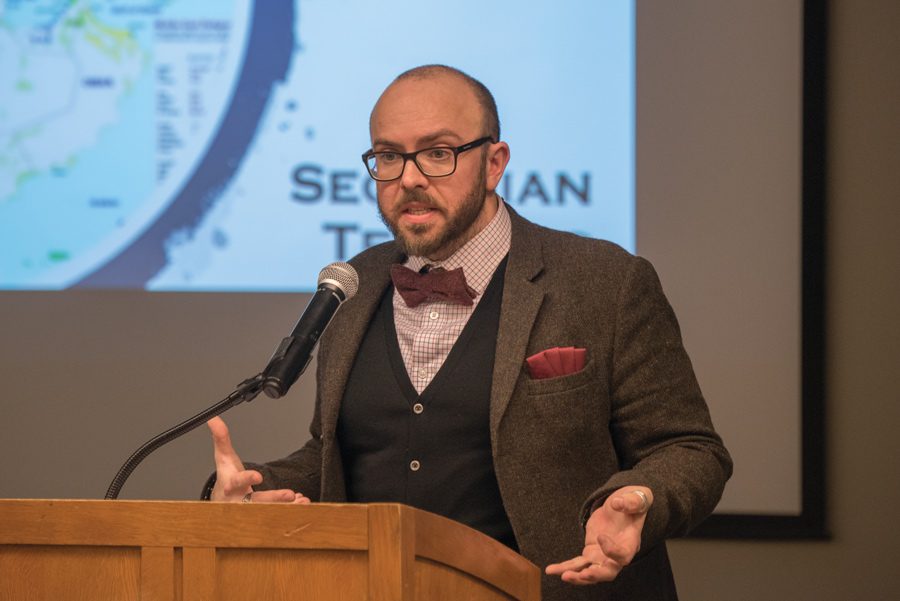Lecturer talks Middle East, tensions between Saudi Arabia and Iran
David Lee/Daily Senior Staffer
Simon Mabon speaks to a crowd of about 90 on Monday night. Mabon evaluated 30 years of history to deconstruct relations between Saudi Arabia and Iran
February 19, 2019
Author and scholar Simon Mabon described the rivalry between Saudi Arabia and Iran as much more complex than it is often portrayed, and he fears uprisings like the Arab Spring in 2011 will occur again within the next three years.
Northwestern’s Middle East and North African Studies Program and the Evanston Public Library hosted Mabon, a senior lecturer in international relations at Lancaster University in the United Kingdom. More than 90 people packed the community meeting room on Monday evening to hear the former advisor to an international relations committee in the House of Lords — the upper house of the UK’s parliament — present the findings of his new book, “Saudi Arabia and Iran: Power and Rivalry in the Middle East.”
With the murder of journalist Jamal Khashoggi by Saudi officials in October and the Warsaw Summit led by the U.S. last week to discuss national security concerns from Iran, Mabon gave a historical breakdown of how tensions between Saudi Arabia and Iran have escalated. He began in 1979 with the Iranian Revolution, which led to the establishment of an Islamic republic.
“It was greeted in such a way by a range of actors across the region,” Mabon said. “From Saudi Arabia, the king said, and I quote, ‘It gives me great pleasure that the new republic is based on Islamic principles.’”
However, Mabon said those feelings did not last. Saudi Arabia had previously relied on claims to Islamic legitimacy to increase its power in the region, and the creation of Iran threatened that legitimacy, he said. Additionally, Saudi Arabia’s Wahhabism — one sect of Islam — was deeply at odds with Iran’s Shia Islam, which Saudis viewed as heretical.
“This wasn’t just a theological issue now,” Mabon said. “It became political. It became security.”
When the Soviet Union invaded Afghanistan in 1979, Saudi Arabia began to finance clerics across the world to spread Wahhabism. Ruhollah Khomeini, the Supreme Leader of Iran at the time, also began trying to “share his vision beyond Iranian borders,” Mabon said, and divided societies across the Middle East began to fear these two states as they sought to expand their influence.
However, in 1990, when a huge earthquake hit Iran, the opportunity for cooperation between the two countries rose and tensions subsided, Mabon said. Saudi Arabia sent aid to Iran to help with relief.
“(It) looks like things are getting better,” Mabon said. “And then something happens.”
For Saudi Arabia and Iran, Mabon said that “something” was the United States’ invasion of Iraq in 2003. He argued this was one of several events that led to the rise of the Daesh, or ISIS, and that coupled with an increased Iranian presence in Iraq, it led to renewed tensions between Iran and Saudi Arabia.
Weinberg senior Dawei Wang said the topic of Mabon’s talk was timely.
“He talked a lot about the historical aspect of the Iran-Saudi Arabian rivalry,” Wang said. “It’s not so clear-cut. There’s a lot of differences in how we view this relationship.”
Evanston resident Lou Schorsch said much of the talk dealt with current events, and if one follows the Middle East in the news, they would understand Mabon.
He added that he learned how to properly pronounce Khashoggi.
“This sort of difficult insidious role of Saudi Arabia — that’s a very open question how that evolves and what comes next for Saudi Arabia,” Schorsch said.
The last slide of Mabon’s presentation displayed an image of a destroyed street in Aleppo, Syria. He said that in the midst of these political conflicts and analysis, there are people struggling and rebuilding processes taking place.
“One of the things that people like to ask me is, ‘How do we defeat terrorism?’” Mabon said. “We all have a responsibility. We need to call out injustice. We need to speak truth to power. We need to challenge people when they use an Islamophobic, xenophobic, misogynistic, homophobic … language. We all are responsible because if we don’t, we are complicit.”
Email: [email protected]
Twitter: @pamesjollard


